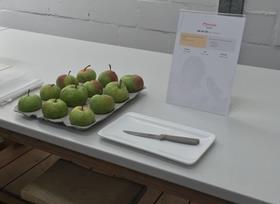
The South African fresh produce industry has undergone huge changes since deregulation in 1997, many of them essential as the country strived to compete across both traditional and newly opened export markets. Varietal development, in terms of improving fruit flavour, shelf life and yield, is one of the key areas for the industry, and as technology has developed, so has the expertise available.
One such expert is Provar, a privately-owned, independent new fruit cultivar and rootstock evaluator and data centre, offering the latest in product development intelligence. The group has been fully involved in industry evaluation for one and a half years, and offers a three-pronged service for new cultivars: monitoring tree characteristics from budding to harvest; performing visual and sensory fruit evaluation and characterisation; and evaluating fruit storage potential and shelf-life.
“We service the fruit industry by helping it put the correct varieties in the right place,” explains Iwan Labuschagne, Provar’s chief executive. “We identify the best-adapted cultivars for the right conditions, and are essentially a mix of scientists and IT support, as we also use software to help improve our evaluation process.”
The bottom line, according to Labuschagne, is that Provar delivers an evaluation service supporting fruit breeders, IP owners, licensees, producers and marketers, enabling the value chain to make informed choices that minimise planting risk, and ensure a healthy and competitive South African fruit industry. Currently, this covers topfruit, stonefruit and grapes.
“We are bombarded by external breeders from other countries who export new varieties to South Africa, leaving our producers in a situation where they are asking ‘what should we plant?’,” he continues. “For example, we imported over 600 different apple varieties and selections over the past six years, but which of these will really add value to the chain? We are there to help answer that question.”
Provar’s evaluation process begins with open fruit exhibitions, where produce is scored according to tasters, and goes all the way through to full-trial evaluation where the commercial potential of a fruit is tested. There is plenty to look at too, as in 2017 alone there were 247 different evaluations. These numbers will only go up in the future, according to Labuschagne, who says there are cultivars that are particularly exciting from a commercial point of view.
“I would say new apple cultivars in general are coming out on top of our evaluations, with pears ranked a bit lower, although there are interesting new selections in locally bred blush and full-red pears,” he adds. “For stonefruit, we are seeing peaches planted less frequently than nectarines, which are high on the list, then of course we have South African-bred plums which are very important for the category.”
Like Provar, the Sapo Trust is all about improvement for the benefit of the industry. A plant improvement organisation first established in 1974, its mission is to develop a comprehensive range of virus-free plant material that can be supplied cost-effectively to the fruit industries in South Africa, pioneering variety development and the commercialisation of new varieties.
Owned by the South African stonefruit, topfruit, table grape, dried fruit and canning fruit associations, Sapo is here to cultivate growth for the future, according to business unit manager for production Frederick Voigt. “We develop a comprehensive range of virus-free plant material that is cost effective for growers,” he outlines. “The five producer associations make the decisions on what we work on, and from this we pioneer new varietal development.”
The team of 60 at Sapo handles some 12 million rootstocks in a year, but only a select few will make the grade commercially. Stonefruit is an example of a category where success has been had in recent years.
“Lots [of stonefruit trees] have been planted since 2010, mainly driven by plums, and we have lots of good local varieties – although we do have to find markets to sell them in,” says Voigt. “In apples, Bigbucks is a very exciting variety that offers good packout and eating quality, and in the next couple of years we will have nearly 1,000ha in the ground as we have sold lots of rootstocks. For pears, Cheeky is an up-and-coming variety, but we must also remember that it is important to not only bring through new varieties, but improve existing ones as well.”






No comments yet